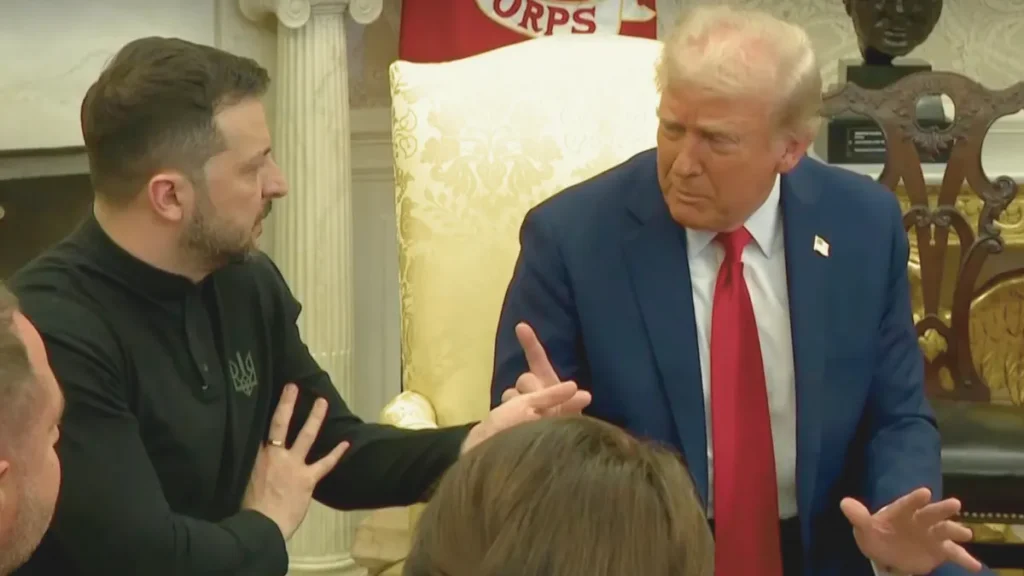Trump Zelenskyy Clash in Oval Office as US Foreign Policy Shifts
The highly anticipated meeting between U.S. President Donald Trump and Ukrainian President Volodymyr Zelenskyy ended in a dramatic confrontation that could alter the course of the Ukraine-Russia war. The Oval Office encounter on Friday turned into a tense exchange as Trump insisted on a swift peace deal with Russia or a withdrawal of U.S. support, leaving Ukraine’s security in jeopardy.
The meeting underscored Trump’s shifting foreign policy priorities and his willingness to challenge long-standing American commitments to allies.
Heated Oval Office Exchange Stuns Diplomats
Diplomatic tensions reached a boiling point as Trump, in front of gathered officials and media, told Zelenskyy that the U.S. would no longer back Ukraine unconditionally. “You either make a deal or we are out,” Trump declared, emphasizing his intent to bring an end to the war on his terms.
The moment marked one of the most contentious public disputes between world leaders inside the White House in recent history.
Zelenskyy, visibly frustrated, countered by highlighting Russia’s history of violating ceasefire agreements. He warned that trusting Russian President Vladimir Putin without concrete security guarantees would endanger Ukraine’s sovereignty. However, Trump and Vice President JD Vance dismissed his concerns, accusing Zelenskyy of being ungrateful and resistant to diplomacy.
A Week of Failed Diplomatic Efforts
The Oval Office showdown capped a week of intense diplomatic efforts by U.S. allies to align Trump with a unified Western stance on Ukraine. French President Emmanuel Macron and British Prime Minister Keir Starmer both engaged in discussions with Trump, urging him to maintain strong support for Kyiv.
Macron proposed a European-led peacekeeping force, while Starmer sought assurances that U.S. military backing would not be abruptly cut off. Despite these efforts, Trump remained focused on securing American economic interests in Ukraine’s critical minerals as part of any agreement.
Trump’s Skepticism Toward Longstanding U.S. Commitments
Throughout the week, Trump’s skepticism toward traditional diplomatic strategies became evident. While European leaders sought a firm stance against Russia, Trump refused to support UN resolutions directly blaming Moscow for its aggression. His aides also began laying the groundwork for potential negotiations with Russian officials, fueling concerns that the U.S. might accept terms unfavorable to Ukraine.

At the heart of the dispute was Zelenskyy’s push for binding security guarantees, which Trump resisted. Instead, Trump emphasized that Ukraine should focus on negotiating directly with Russia rather than relying on indefinite American military aid. This approach signaled a stark departure from previous U.S. policy, which prioritized Ukraine’s defense against Russian expansionism.
The Breaking Point: A Diplomatic Fallout
The discussion, which began with polite exchanges, quickly deteriorated when Zelenskyy questioned Trump’s trust in Putin. JD Vance, a vocal critic of continued U.S. aid to Ukraine, sharply rebuked Zelenskyy for questioning Trump’s strategy. The argument escalated as Trump accused the Ukrainian leader of undermining diplomatic efforts. “You’re gambling with World War III,” Trump warned, suggesting that Zelenskyy’s defiance was jeopardizing broader global stability.
Senator Lindsey Graham, a staunch supporter of U.S. military aid, had privately advised Zelenskyy to avoid confrontations with Trump. However, once the discussion turned hostile, Zelenskyy found himself on the defensive, with Trump openly questioning the value of continued U.S. involvement in the war.
Zelenskyy’s Response and Uncertain Future for Ukraine
Following the disastrous meeting, Zelenskyy was swiftly escorted out of the White House, canceling plans for a joint press conference and economic agreement signing. Trump later told reporters he would not “embolden” a leader unwilling to negotiate for peace, further isolating Zelenskyy on the global stage.
In a televised interview on Fox News, Zelenskyy acknowledged the confrontation’s damaging impact but reiterated Ukraine’s need for strong U.S. backing. “We want just and lasting peace,” he stated, emphasizing that his country could not afford to ignore Russia’s past violations. Despite his efforts to smooth relations, Zelenskyy admitted that without continued American support, Ukraine’s ability to defend itself would be severely compromised.
Implications for U.S. Foreign Policy
The fallout from the Oval Office confrontation highlights broader shifts in U.S. foreign policy under Trump’s leadership. His administration’s increasing reluctance to provide unconditional military aid raises concerns among European allies, who fear a weakened Ukraine will embolden Russia. Moreover, Trump’s willingness to engage directly with Moscow suggests that U.S. diplomatic efforts may prioritize economic interests over longstanding security commitments.
Trump’s foreign policy moves extend beyond Ukraine. In recent weeks, he has proposed economic sanctions on Mexico and Canada and floated controversial ideas regarding the Israel-Palestine conflict. His unorthodox approach signals a broader transformation in America’s role on the world stage, where alliances are reevaluated based on perceived financial and strategic benefits.
What Comes Next?
With the U.S. signaling a potential shift away from full support for Ukraine, Kyiv must now explore alternative security arrangements. European nations may be forced to assume a larger role in Ukraine’s defense, while diplomatic engagement with Russia could become unavoidable. For now, Zelenskyy faces the difficult task of navigating this uncertain landscape, knowing that U.S. support is no longer guaranteed.
Also Read: What Is the Official Language of the United States?
As Trump continues to redefine American foreign policy, the world watches closely to see whether his bold strategies will yield lasting peace or further destabilize global relations. The Oval Office confrontation with Zelenskyy is a stark reminder that diplomatic negotiations under Trump’s leadership will be anything but predictable.

